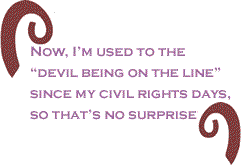
|
|||||||||||||||||||||
|
||||||||||
| Press your F11 Key for a larger full screen view | ||||||||||
 |
||||||||||
|
||||||||||
The current issue is always free to everyone If
you need the access available to a |
||||||||||
 |
||||||||||
The conflicts that Mayor Antonio Villaraigosa are having with the African American community have taken an increased (and regressive) posture, as the downtown government gossip tabloid, Los Angeles City Beat, has weighed in on the matter - if you want to call it that. In its �Frontlines� by-line last week, writer Alan Mittelstaedt entitled the piece, �L.A. Sniper: Antonio�s Negro Problem,� with a sub-caption of �How many times can �Mayor Ambition� get away with pandering to L.A.�s black community?� City Beat prides itself on being a mix between the L.A. Times, L.A. Weekly and the Federal Register, offering mainstream and alternative commentary, while keeping the L.A. �power establishment� plugged in to what�s going on in City Hall, and white folks plugged into communities they rarely frequent, namely the Eastside and the Southside of the city. The fact that they would be particularly plugged into the black community�s issues and the way they are framing this issue, seem that City Beat is more interested in stirring the pot than asking a question. And the fact that it would refer to the African American community�s accountability agenda as a �Negro Problem,� and refer to Blacks in a context to which they have not been referred to (in the collective) in over forty years (Blacks haven�t been Negroes since before the Black Power movement started in 1965), lets us know, quite succinctly, how the article capsulizes the racial posture of its editors - and probably much of the downtown establishment. There�s a whole history to African Americans being associated as a �problem� in America�s post slavery social construct, which I�ll explain in a minute. However, more relevant to this point is that the Mayor does have a Negro problem. It is not in the community, however. It is in his office. Two weeks, I took to task the Mayor�s firing of Gloria Jeff and the reality (not perception) that he manipulates his appointment power, with his hiring and firing authority of department heads, when it come to the African Americans in the city. He frequently convolutes the two issues and uses the often manipulated statistics of racial/ ethnic �population parity� to justify his actions. The day the commentary ran on Eurweb.com (which breaks two days before the weekly print media), I received a call from the Mayor�s �special assistant� to the black community (the Mayor has no black deputy Mayor), Rev. Leonard Jackson, telling me he�d like to meet to �go over my numbers� because he suspected that he has information I do not have. I told him I didn�t think so. In the nation�s most diverse city, the Mayor�s appointments are public record and every community keeps its own racial scorecard. Jackson wanted to know my source. I told him that plenty of groups have this information, including the black group headed by Valerie Shaw (I couldn�t remember the name of the group). My numbers have since been validated by two other non-black groups. Jackson went back and told the Mayor, and his (white) Chief of Staff called Valerie in and accused her of giving information to the press. Now understand, Valerie Shaw has been a commissioner for three Mayors and has a long history of advocating for African American empowerment in City government. She is also a friend. When I have it wrong, she tells me I have wrong � and when I have it right, she�s tells me I�m on point. She told me I was on point on this issue � but she didn�t give me the information; I already had it. The more troubling aspect of this whole scenario is that a so-called �African American� representative who is in place to keep the Mayor up on black community issues for the purpose of constructive resolution, �outted� this sister on an issue of major concern to the black community. That�s something a butt (crack)-kissing, boot-licking, buck-dancing, head-scratchin�, stepin� fetchit, schuffin� a** Negro would do.
Now,
is Rev. Jackson that kind of Negro? You can decide for yourself,
but I�ll never trust him again and here�s why: Rev. Jackson
seemed more concerned about protecting the Mayor than protecting
(and advocating for) African American interests. When Ms. Shaw
jammed him about it, he told her that he didn�t tell on her,
that the Chief of Staff heard himself because he was on the
line with Jackson when Jackson was talking to me. Now, I�m
used to the �devil being on the line� since my civil rights
days, so that�s no surprise. But for him to know and tell someone
that his �overseer� was on his line, means one of two things
(maybe both): either the Mayor�s office doesn�t trust Is it a problem? Well, anytime African Americans demand equality and accountability, it�s a problem. This �problem� conversation started in the 1870s as part of the Redemption Period (1877-1896) discourse that sought to try to determine what to do with Blacks, now that they had their freedom, their social and political equality, and were demanding economic parity in the midst of a depression and an industrial revolution. The solution to the �Negro Problem� was to repeal their political rights and to exclude them from society, socially and legally � culminating with the Plessy decision in 1896. Fifty years later, society was still debating the "Negro Problem," as the first ever international study on America�s race relations was released by the Carnegie Foundation in 1944. Written by Swedish sociologist, Dr. Gunnar Myrdal (because no American, white or black, were viewed as being able to be objective enough to write a study on race in America), the study was titled, �An American Dilemma: The Negro Problem and Modern Democracy.�
For City Beat to reference the black community in Los Angeles as a �Negro Problem� certainly has a dual connotation which they would not expect us to understand. But we do. The city leaders don�t see any real value in the African American demographic beyond its ability to elect a Mayor. If the black community limits its involvement in civic affairs to that, it is a problem and City Beat called it (as offensive as it is). If L.A. Blacks are demanding an equal power share in the economic and social affairs of the city, and the Mayor chooses to pander rather than listen, that�s a problem, too. But it�s not in the community, it�s in the Mayor�s office and he�s needs to rid himself of �the Negro perspective� around him before his alienation from the black community becomes permanent. BlackCommentator.com Columnist Dr. Anthony Asadullah Samad is a national columnist, managing director of the Urban Issues Forum and author of the upcoming book, Saving The Race: Empowerment Through Wisdom. His Website is AnthonySamad.com. Click here to contact Dr. Samad. |
||||||||||
| October
25,
2007 Issue 250 |
|
| Printer Friendly Version in resizeable plain text format format |
 |
 |
 |
| |
| |
































